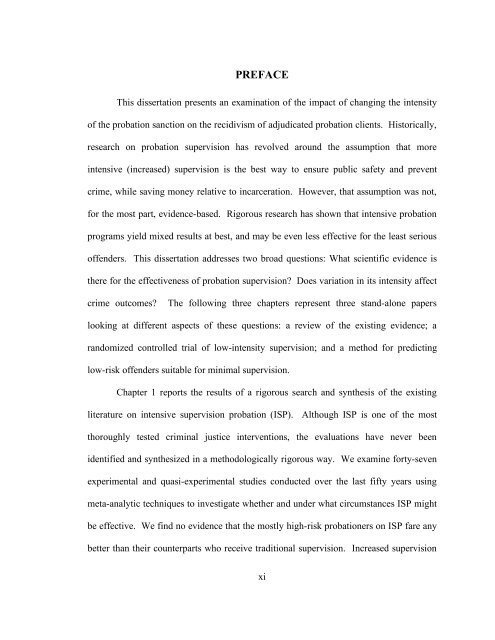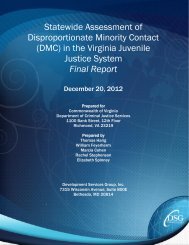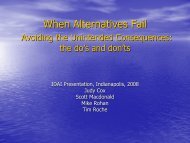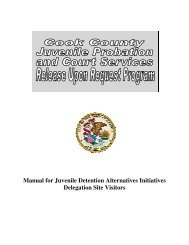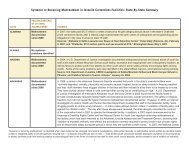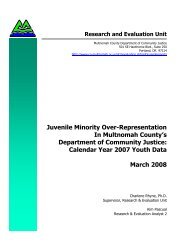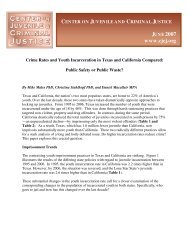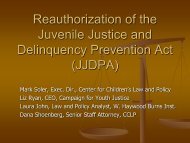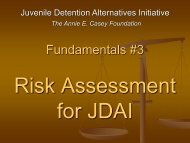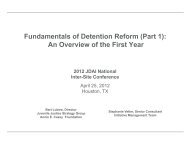The Effects of Sanction Intensity on Criminal Conduct - JDAI Helpdesk
The Effects of Sanction Intensity on Criminal Conduct - JDAI Helpdesk
The Effects of Sanction Intensity on Criminal Conduct - JDAI Helpdesk
You also want an ePaper? Increase the reach of your titles
YUMPU automatically turns print PDFs into web optimized ePapers that Google loves.
PREFACE<br />
This dissertati<strong>on</strong> presents an examinati<strong>on</strong> <str<strong>on</strong>g>of</str<strong>on</strong>g> the impact <str<strong>on</strong>g>of</str<strong>on</strong>g> changing the intensity<br />
<str<strong>on</strong>g>of</str<strong>on</strong>g> the probati<strong>on</strong> sancti<strong>on</strong> <strong>on</strong> the recidivism <str<strong>on</strong>g>of</str<strong>on</strong>g> adjudicated probati<strong>on</strong> clients. Historically,<br />
research <strong>on</strong> probati<strong>on</strong> supervisi<strong>on</strong> has revolved around the assumpti<strong>on</strong> that more<br />
intensive (increased) supervisi<strong>on</strong> is the best way to ensure public safety and prevent<br />
crime, while saving m<strong>on</strong>ey relative to incarcerati<strong>on</strong>. However, that assumpti<strong>on</strong> was not,<br />
for the most part, evidence-based. Rigorous research has shown that intensive probati<strong>on</strong><br />
programs yield mixed results at best, and may be even less effective for the least serious<br />
<str<strong>on</strong>g>of</str<strong>on</strong>g>fenders. This dissertati<strong>on</strong> addresses two broad questi<strong>on</strong>s: What scientific evidence is<br />
there for the effectiveness <str<strong>on</strong>g>of</str<strong>on</strong>g> probati<strong>on</strong> supervisi<strong>on</strong>? Does variati<strong>on</strong> in its intensity affect<br />
crime outcomes?<br />
<str<strong>on</strong>g>The</str<strong>on</strong>g> following three chapters represent three stand-al<strong>on</strong>e papers<br />
looking at different aspects <str<strong>on</strong>g>of</str<strong>on</strong>g> these questi<strong>on</strong>s: a review <str<strong>on</strong>g>of</str<strong>on</strong>g> the existing evidence; a<br />
randomized c<strong>on</strong>trolled trial <str<strong>on</strong>g>of</str<strong>on</strong>g> low-intensity supervisi<strong>on</strong>; and a method for predicting<br />
low-risk <str<strong>on</strong>g>of</str<strong>on</strong>g>fenders suitable for minimal supervisi<strong>on</strong>.<br />
Chapter 1 reports the results <str<strong>on</strong>g>of</str<strong>on</strong>g> a rigorous search and synthesis <str<strong>on</strong>g>of</str<strong>on</strong>g> the existing<br />
literature <strong>on</strong> intensive supervisi<strong>on</strong> probati<strong>on</strong> (ISP). Although ISP is <strong>on</strong>e <str<strong>on</strong>g>of</str<strong>on</strong>g> the most<br />
thoroughly tested criminal justice interventi<strong>on</strong>s, the evaluati<strong>on</strong>s have never been<br />
identified and synthesized in a methodologically rigorous way. We examine forty-seven<br />
experimental and quasi-experimental studies c<strong>on</strong>ducted over the last fifty years using<br />
meta-analytic techniques to investigate whether and under what circumstances ISP might<br />
be effective. We find no evidence that the mostly high-risk probati<strong>on</strong>ers <strong>on</strong> ISP fare any<br />
better than their counterparts who receive traditi<strong>on</strong>al supervisi<strong>on</strong>. Increased supervisi<strong>on</strong><br />
xi


